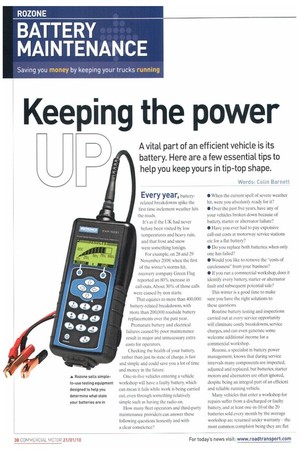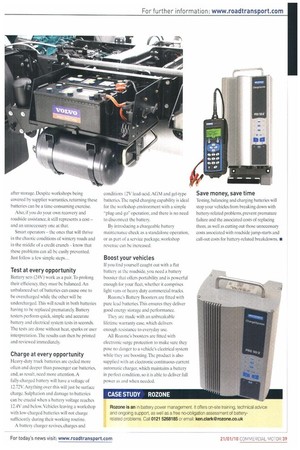Keeping the power
Page 38

Page 39

If you've noticed an error in this article please click here to report it so we can fix it.
A vital part of an efficient vehicle is its battery. Here are a few essential tips to help you keep yours in tip-top shape.
Words: Colin Barnett
Every year, batteryrelated breakdowns spike the first time inclement weather hits the roads.
It's as if the UK had never before been visited by low temperatures and heavy rain, and that frost and snow were something foreign.
For example, on 28 and 29 November 2009, when the first of the winter's storms hit, recovery company Green Flag reported an 80% increase in call-outs. About 30% of those calls were caused by non starts.
That equates to more than 400,000 battery-related breakdowns, with more than 200,000 roadside battery replacements over the past year. Premature battery and electrical failures caused by poor maintenance result in major and unnecessary extra costs for operators.
Checking the health of your battery, rather than just its state of charge, is fast and simple and could save you a lot of time and money in the future.
One-in-five vehicles entering a vehicle workshop will have a faulty battery, which can mean it fails while work is being carried out, even through something relatively simple such as having the radio on.
How many fleet operators and third-party maintenance providers can answer these following questions honestly and with a clear conscience? • When the current spell of severe weather hit, were you absolutely ready for it?
• Over the past five years, have any of your vehicles broken down because of battery, starter or alternator failure?
• Have you ever had to pay expensive call-out costs at motorway service stations etc for a flat battery?
• Do you replace both batteries, when only one has failed?
• Would you like to remove the "costs of carelessness" from your business?
• If you run a commercial workshop, does it identify every battery, starter or alternator fault and subsequent potential sale?
This winter is a good time to make sure you have the right solutions to these questions Routine battery testing and inspections carried out at every service opportunity will eliminate costly breakdowns, service charges, and can even generate some welcome additional income for a commercial workshop.
Rozone, a specialist in battery power management, knows that during service intervals many components are inspected, adjusted and replaced, but batteries, starter motors and alternators are often ignored, despite being an integral part of an efficient and reliable running vehicle.
Many vehicles that enter a workshop for repairs suffer from a discharged or faulty battery, and at least one-in-10 of the 20 batteries sold every month by the average workshop are returned under warranty — the most common complaint being they are flat
after storage. Despite workshops being covered by supplier warranties, returning these batteries can be a time-consuming exercise.
Also, if you do your own recovery and roadside assistance, it still represents a cost — and an unnecessary one at that.
Smart operators — the ones that will thrive in the chaotic conditions of wintery roads and in the middle of a credit crunch — know that these problems can all be easily prevented. Just follow a few simple steps...
Test at every opportunity Battery sets (24V) work as a pair. To prolong their efficiency, they must be balanced. An unbalanced set of batteries can cause one to be overcharged while the other will be undercharged. This will result in both batteries having to be replaced prematurely. Battery testers perform quick, simple and accurate battery and electrical system tests in seconds. The tests are done without heat, sparks or user interpretation.The results can then be printed and reviewed immediately.
Charge at every opportunity
Heavy-duty truck batteries are cycled more often and deeper than passenger car batteries, and, as result, need more attention. A fully-charged battery will have a voltage of 12.72V Anything over this will just be surface charge. Sulphation and damage to batteries can be crucial when a battery voltage reaches 12.4V and below. Vehicles leaving a workshop with low-charged batteries will not charge sufficiently during their working routine.
A battery charger revives, charges and conditions 12V lead-acid, AGM and gel-type batteries. The rapid charging capability is ideal for the workshop environment with a simple "plug-and-go" operation, and there is no need to disconnect the battery.
By introducing a chargeable battery maintenance check as a standalone operation, or as part of a service package, workshop revenue can be increased.
Boost your vehicles
If you find yourself caught out with a flat battery at the roadside, you need a battery booster that offers portability and is powerful enough for your fleet, whether it comprises light vans or heavy duty commercial trucks.
Rozone's Battery Boosters are fitted with pure lead batteries This ensures they deliver good energy storage and performance.
They are made with an unbreakable lifetime warranty case, which delivers enough resistance to everyday use.
All Rozone's boosters are fitted with electronic surge protection to make sure they pose no danger to a vehicle's electrical system while they are boosting. The product is also supplied with an electronic continuous current automatic charger, which maintains a battery in perfect condition, so it is able to deliver full power as and when needed.
Save money, save time
Testing, balancing and charging batteries will stop your vehicles from breaking down with battery-related problems, prevent premature failure and the associated costs of replacing them, as well as cutting out those unnecessary costs associated with roadside jump-starts and call-out costs for battery-related breakdowns •




































































































































